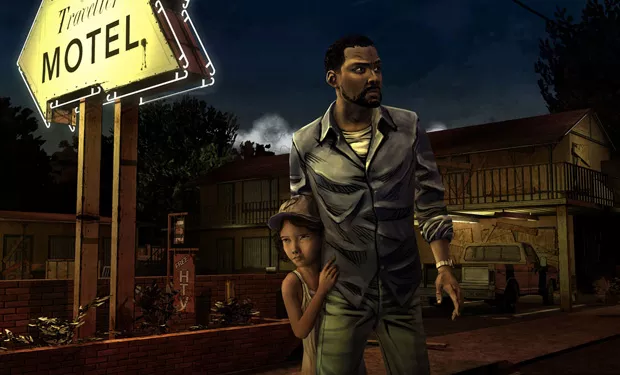A video game made me cry last night.
Over five chapters, The Walking Dead, made by thesame company that churns out so-so bunny detective Sam and Maxadventure, puts you in a shoes of an escaped convict taking care of alittle girl in the midst of a zombie apocalypse.
And it’s absolutely brutal. People die. Sometimes they die again. Other times they betray you or say things that make you furious or empathetic or downright devastated.
It’s not like media hasn’t made me tear up before. Sure, I got a bit weepy inthe series finale of Lost or that super-sad SouthPark episode where Stancoaches a pee-wee hockey team. Television is good at that. You spend enoughtime with the characters, that you almost see them as friends.
Video games, by contrast, do a lousy job of creating an emotional response.You shoot tons of dudes or robots and zombies and don’t feel a thing. If youmess up, you reload. Big deaths usually happen through cutscenes with stiltedcomputer acting, lousy writing, or interminably long translated-from-Japanesedialogue.
The game part of games, the reflex-based bullet firing or car racing, usuallyworks against the character development.
But The Walking Dead isn’t like most video games. You don’t killhundreds of zombies. Across five different chapters, you might personally kill25. You don’t solve excruciatingly difficult puzzles. Most of the time, thesolution to any problem is perched directly in front of you – all of you have todo is click.
Most of what you do is make decisions. You decide how to answer or askquestions, you decide which tool to grab off the wall. Sometimes you decide wholives and who dies, or who gets a limited supply of food when you’re hungry.
Those decisions do what books and movies can’t: They immerse you directly inthe story.
Most video games immerse you in the game — you directly control howmany pedestrians you hit with your stolen sports car – but then kick you outinto cutscene when the story starts. Here, that rarely happens. The story isthe game. If the game was more “fun” to play it would defeat that.
By making a character’s choices you begin to associate yourself with him. The results of those choices becomes personal. It somehow manages a deeper level of immersion.
You’re responsible for the little girl. Your actual choices are responsiblefor horrible things happening to the people you care about.
It’s one thing, on a TV show, to hear a dying person say their last words.It’s another thing entirely to get to choose them.

